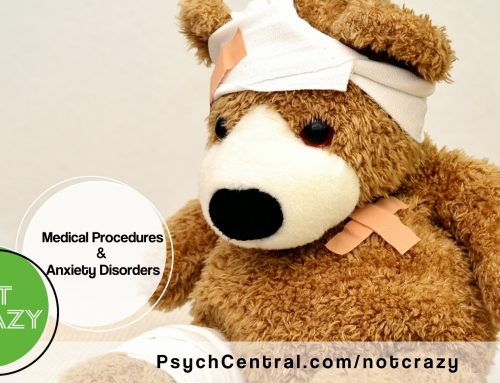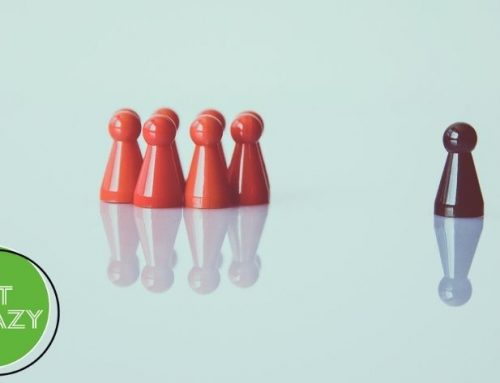What happens if your mental illness prevents you from working and you’re about to be fired? Yes, it’s illegal, but sadly, it happens. In this podcast, we discuss who you can contact for help. We also share our own stories of getting fired for being sick and how we handled it. Click the player below to listen!
SUBSCRIBE & REVIEW
Computer Generated Transcript for “Holding Down a Job” Episode
Editor’s Note: Please be mindful that this transcript has been computer generated and therefore may contain inaccuracies and grammar errors. Thank you.
Announcer: You’re listening to Not Crazy, a Psych Central podcast. And here are your hosts, Jackie Zimmerman and Gabe Howard.
Gabe: You’re listening to the Not Crazy Podcast. I’d like to introduce my co-host, Jackie Zimmerman, who lives with depression and anxiety.
Jackie: And you guys know my co-host, Gabe Howard, who lives with bipolar disorder.
Gabe: And today, we’re talking about losing our jobs. Now, before you panic, we’re not losing our podcasting jobs, but Jackie and I have something in common. We have both lost, I kind of want to say high end jobs, like we both worked for Fortune 500 companies, made decent money, had good health insurance, and because of our health issues. We found ourselves out on our ass.
Jackie: Well, when I got fired, it was not from a Fortune 500 company.
Gabe: Oh, well, then, was it from like a Fortune 1000 company. Or am
Jackie: No, no.
Gabe: I’m just beating you in every way.
Jackie: No. It was a, it wasn’t a huge, huge company, but they weren’t just like a tiny deal. They were doing pretty well.
Gabe: And that’s good, and I think there’s some data to mine here. I was literally fired from a Fortune 500 company. It was a huge, huge employer and yours was more of a medium employer. And it’s also important to point out that I live in Ohio and that you live in Michigan. And that some of the laws we’re going to talk about are state laws. And some of them, like the ADA, which is the Americans with Disabilities Act, are federal laws. And all this to say big star, the laws that govern your employment may vary based on the size of your employer and the state that you’re in. And of course, for our international listeners, we have no idea what’s going on. We are only talking about what happened to us in the United States.
Jackie: Yeah, I just assume anywhere outside of the United States they just fire people for funsies because who knows what their laws are over there. But then when you get fired, they’re like, but here’s your health insurance because you know, we care about you.
Gabe: And that really is kind of an interesting point to bring up. It’s hard to be sick. I don’t think there’s anybody that’s going to disagree with that. But in the United States, more often than not, your health insurance is tied to your employment. So you’re sick. You lose your job because you’re sick. Ipso facto, you lose your health insurance for being sick. This is scary. It’s an incredible burden.
Jackie: It definitely is, and especially because, like you said, there’s this whole factor in there of like, well, if I get really sick, I need my health insurance, but I may get really sick, I could lose my job and then lose my health insurance, but then I’m gonna get even sicker because I have neither of those things. And America’s just like, yeah, deal with it. Sucks to be you. Well, at least that’s how it used to be. When this happened to me, the Affordable Care Act did not exist. And I think for you, too. So now there’s at least kind of a safety net, like it’s a spendy expensive safety net. But there is one versus before. It was like, yeah, it sucks to be you for sure.
Gabe: You are correct, Jackie. This happened to me before the Affordable Care Act, which a lot of people call Obamacare, but it’s actually called the Affordable Care Act. And I know that it happened to you before the Affordable Care Act. And while they closed a lot of loopholes, things like preexisting conditions, there’s, of course, a marketplace. It’s not perfect, but it is an improvement. And I don’t think this gets enough press. I know that the ACA is not perfect. Nobody’s trying to say that it’s perfect. But in this way, it created opportunity for people who lost their jobs because of illness to find health coverage. And listen, don’t be sick in America without health insurance. And please do not look at this as political. We’re just trying to give you your options. As of right now, in 2020, if you find yourself unemployed without health insurance, you have a shot at finding health benefits. And things like preexisting conditions, mattered a lot back when Jackie and I were fired. And that was the thing that scared me the most when I lost my job. I effectively had 45 days to find a new job or bipolar disorder became a preexisting condition. And once it became a preexisting condition, it meant that no health insurance company or future employer had to cover it forever, which meant my long term, severe and persistent mental illness. I would have to pay for out of pocket for the rest of my life. And listen, if I was capable of paying cash for a severe and persistent illness, the world would be a different place, Jackie.
Jackie: Well, and what I did at the time, so. Because I was always very afraid of having my health insurance tied to my job for all of these reasons for getting fired or being too sick to work. I took out a private plan which was insanely expensive at the time. So I was lucky because when I did get sick and I eventually got fired, I still had health insurance. But I paid a ridiculous premium for that privilege, I guess. And by me, I mean my parents because I could not afford it. I was making like thirty two thousand dollars a year at the time, but I knew I just like had this feeling that I didn’t want my health insurance to be tied to my employer.
Gabe: It’s important to point out that Jackie and I are very lucky we have a support system. We have family and friends and people who were not only there for us physically, but we were very fortunate in that they could be there for us monetarily. Not everybody has that. In my situation, my significant other paid for Cobra because COBRA was a thing back then. COBRA is a thing now. But it was, it was massively expensive. Like you said, it was
Jackie: It’s so expensive.
Gabe: It was insanely expensive. But I couldn’t let the preexisting condition clause trip. Jackie, I want to talk about the circumstances surrounding your job loss. Can you walk us through the Reader’s Digest version of your story?
Jackie: Sure can. So this was right around the time that I was diagnosed with ulcerative colitis. So it was 2009. I was 24-ish. And that diagnosis kind of came out of nowhere. So I was like, happy, relatively healthy. And then all of a sudden I was very sick. And I was in the E.R. all the time. Then I was hospitalized all the time. And then I found out I was going to need to have three surgeries, which turned into four, and each recovery was gonna be six to eight weeks for each surgery. So I talked to my employer about this, and I know it was not good news. Really? That’s terrible news for your employer, especially because at this job, like I said, it was a smaller company. I was really the only person who did my job. And that’s a thing that I am well aware of, that when I was gone, the job was not getting done, whether or not that’s right or wrong. And I mean, maybe they should have hired somebody, maybe they should have outsourced. My job didn’t get done when I wasn’t there. So when I was really sick, they were very supportive in the beginning because it was a small company. And then the longer I was out. Things like calling me a day after surgery, going, when are you coming back started to happen or calling my mom when I didn’t answer the phone after surgery because I was recovering from open surgery where I had an organ removed and kind of tracking me down through my family members, things that were kind of just borderline unacceptable, in my opinion, as a patient trying to recover from major surgery.
Jackie: And when I would come back to work, I did have a hard time re acclimating to my job after being gone for six to eight weeks after having major surgery. Every time I will say I was probably not at the tip top of my game, but it eventually got to the point where they were like, you’re gone too much. And when you’re here you’re probably not giving us the best you can give. And essentially, we’d like you to leave. And that happened after a very candid conversation where I told them, I can’t quit, I won’t quit. I’m not gonna quit this job. I need this job. I need the money. And I also knew that if I quit, I would never get unemployment. So I basically told them, I am going to keep showing up until you tell me to stop showing up. And then they told me to stop showing up.
Gabe: My situation is almost a mirror image of that, except with a much, much, much larger company. I was diagnosed with bipolar disorder after being in a psychiatric hospital. I was out for about six weeks. I came back in. I told everybody that I had bipolar disorder because I just didn’t hide it. And then over the next year, I kept having to be out. I needed a day program. I would have horrible panic attacks at work and I would be off for two weeks. I do feel like I was giving 110 percent when I was there. The problem is, as you know, I would only last for a month or two before the symptoms of bipolar disorder would come back. I was in a call center. It was a big, big call center. So there were 30 other people who could do my job when I was out. So it was not the exact same situation as yours, Jackie. I’m not saying that they didn’t need me. I’m not saying that I wasn’t helpful. I’m not saying that I didn’t have a purpose. Obviously, they hired me for a reason. But, you know, it’s hard. It’s fascinating to me that both of us are trying to put ourselves in the shoes of our employers. That speaks volumes, because we’re just two people. We’re not a company. We don’t hire people. We’re just a couple of people. And we’re like, well, I do understand why the, you know, for profit corporation was having problems with us as employees. But the reverse isn’t true. Neither one of these companies said, wow, we hired somebody and they’re sick. They’re struggling. They have their health insurance through us. We want to put ourselves in their shoes and see what we can do to help them. And I think this is a fascinating point to be made about our society. We’re trying to cover for the employer. The employer is not trying to cover for us.
Jackie: That is painfully true. It’s something also that I feel like when I tell this story, I’m always like, I get it, you know, small company. I was the only one there, like, you know, you gotta get your stuff done. They had a business to run. It’s almost like I make excuses for them, but I try to be realistic and understanding that they did have a business to run. And could they have hired somebody part time? Probably. Could they have found a replacement? Probably. Could it have been handled differently? Probably on both ends. But at the end of the day, did they do a shitty thing? Yeah. So I needed them to fire me. So that way I could collect unemployment because I knew I couldn’t get another job. At that time. I was too sick to work anywhere else. So is this technically abusing the system? Yeah, probably. Probably shouldn’t admit that on the podcast here, but it was like 15 years ago now. So it doesn’t matter. But anyway, the point is, yes, I was in a position where I couldn’t work the way that they wanted me to work anymore. Were they willing to like work with me to do some work from home stuff? No. So that was also part of the problem. So I couldn’t afford to quit. I couldn’t. It’s why I told them I’m not going to quit.
Gabe: Listen, it’s fucked up that this is how this is handled. I’m not going to lie. I think it’s fucked up. And I understand why people who are not sick, who don’t have health challenges are hearing this. And they think that people with mental health challenges are scamming the system. They’re playing the game. I understand why it sounds like that, but a moment of real talk. This is the path. It’s the path that was created for people with mental illness. We have an invisible illness. It’s very, very, very difficult to get any sort of compassion or help or understanding. And it creates this situation where we have to do these mental gymnastics to wrap our minds around the bureaucracy and the bullshit that has been created for us to overcome all while sick. There is a ray of hope. I’m not saying it’s a fantastic ray, but there is a ray of hope. The Americans with Disabilities Act does cover mental health issues. Now, it’s got a whole bunch of challenges that in the interest of real talk, we’re going to discuss. But Jackie, what’s the ADA?
Jackie: So the ADA is the Americans with Disabilities Act, which basically says that if you are somebody with a disability at your job, in order to make sure that you can do your job to the best of your ability, your employer is required to provide a reasonable accommodation for you. It also protects your job. It does all kinds of things. But right now, we’re kind of really focusing on the reasonable accommodation portion of it, because what that does, it’s supposed to sort of level the playing ground. So fear somebody like me. I have an issue with fluorescent lighting, right. I could tell my employer, I need you to remove the fluorescent lighting. That is a reasonable accommodation and they should do it. Other things like moving your desk or providing noise-cancelling headphones, things like this are what’s considered reasonable accommodations to help you do your job.
Gabe: And there’s a whole stack of reasonable accommodations from service animals to equipments change to even moving your job or being reassigned to a different job. It’s important to understand that you do have to work with your employer to get these. They don’t have to read your mind. They don’t have to see, oh, you’re struggling, it must be a mental health or a mental illness issue. We will offer them to this person. You do have to be proactive. I want to be very, very clear. This is on you. You have to go to human resources, your supervisor, your boss, and discuss with them what you need. If you work for a big company, I strongly, strongly suggest that you bypass your supervisor, your management, and you go straight to human resources. In mid-sized or smaller companies, human resources and your boss or your supervisor are often the same person.
Jackie: I totally agree. If you have the ability to go to H.R. and have this conversation with somebody who’s not your boss, definitely do it.
Gabe: We’ll be right back after these messages.
Gabe: And we’re back.
Jackie: The problem with asking for reasonable accommodations is that you have to ask for them and you have to disclose your illness. And I know a lot of people don’t want to do that. But the problem is the ADA cannot protect you, cannot make sure you don’t get fired for some bullshit if you don’t disclose. It’s a real catch 22 for anybody that has any kind of illness. If you are worried that, you know, maybe disclosing is going to get you fired or they’re going to use it against you, which happens even though it’s illegal.
Gabe: When it comes to disclosing an illness or working with an illness, document everything, and don’t count on your employer to make your case for you. You document it and keep all that paperwork at home. Document who you spoke to in H.R. when you told your supervisor what you asked for and take all of that home. Keep it all at home. I know that it sucks, but we are planning for failure here. Hopefully you won’t need it. It’s like car insurance. Hopefully you pay your monthly premium. You never wreck your car. And hey, is this free money for the insurance company? But I gotta tell you, if you run your car into a tree, you’re gonna be really, really happy you have that insurance. Insurance is planning for failure, documenting everything. Keeping it at your house is the same thing. Hopefully you never need it, but if you do, it’s there. But, Jackie, this brings up like a really big question that everybody is probably thinking, well, you just said it was illegal to do this. Why don’t you sue? I just love this. It’s like the Law & Order thing. It’s like, oh, it’s illegal. Why don’t you sue? People do illegal stuff all the time. But for some reason, when it comes to employee-employer relationships, they’re like, well, that’s illegal. That never happens. Murder happens, people. Why didn’t you sue? Like you, Jackie? Why didn’t Jackie Zimmerman sue?
Jackie: I got this question so many times. From the moment I got fired to like telling the story later to my nurses, to everybody. Well, you should sue. This is illegal. OK. Yeah, for sure. Illegal. Like they knew about my illness. They could have provided reasonable accommodations. Yes. To all of those things. However, I was literally fighting for my life at this time. I was having all of these surgeries on the brink of literally dying, not the millennial use of literally, but literally dying and fighting for my life. When the fuck did I have time to find a lawyer? Develop a case and sue this employer spending time in all of these courtrooms and all of this prep stuff. It just wasn’t an option. There was no time. There was no energy when you’re fighting for your life or your stability, this is not on the forefront. Not at all.
Gabe: The other thing to consider is that in order to sue, your medical records become public. A trial is public. So you just lost a job for having serious and persistent mental illness or you just lost a job for having a mental health issue. And now all of a sudden that’s public. And the fact that you’re suing your employer is public. Those are two pretty big barriers to finding another job at some point in the future that I don’t think that people really take into account. I’m not trying to discourage anyone from contacting a lawyer. In fact, I’m gonna go the opposite direction. These are the reasons that people don’t want to sue. I’m not saying that they’re good or bad, but none of that matters when it comes to making an appointment with a lawyer. It’s free. Consultations are free. Lawyers will take this on contingency, which means if you win, they’re going to take a cut. You can discuss that with them. But the sitting down, showing a lawyer your case. Remember all that documentation that I told you to keep at home discussing what happened? That’s all free. You’re still very private. You’re still on your side and they can give you all of the options. Options are extraordinarily valuable in your situation. Know what your odds are. See what an attorney thinks.
Jackie: Gabe, what did you do?
Gabe: I did contact an attorney. I did not sue because that really, really scared me, the idea of going through a trial, the idea of making my medical records public. I also want to be very clear. I did not follow the advice that I gave. I did not have any of this documentation at home. In fact, I don’t even think I had any of this documentation at work. So, you know, proving it became an issue. And the lawyer was very candid with me and said, look, you’re a 28 year old male and you look healthy and you’re trying to claim that you can’t work over a mental illness and they’re going to claim that you’re faking. When people look at you, they’re just going to see a healthy young man who is trying to get out of work. They’re going to paint you as a manipulator. And all of your information is now public. This very, very, very, very much scared me. I don’t blame him for this. Please do not write us letters about how lawyers are evil. They evaluate your case. They see their options to win. And he did not see a clear path to victory for me. He saw a clear path to Loserville, and that would have been even worse. I lose my job and I lose. But there’s something I missed. I could have called the Ohio Department of Jobs and Family Services and lodged a complaint that I was let go for having an illness. Would this have put any resources or money in my pocket? Probably not, but at least it would have documented what they did. And maybe a year from now or two years from now or three years from now, when this happens to the next Gabe or the next Jackie, all of those complaints add up.
Gabe: But I was unaware that this was an option. And it’s different in every state. Search on Google for workman’s comp, search for let go because of mental illness. Search for jobs and family services. Call the unemployment office and say, I was let go for being sick and ask what you can do. These were things that I did not know when it comes to suing. It’s kind of a mixed bag, right? But all of these complaints that you can file, you can file them for free. And while it may not put money in your pocket, I’m telling you, I would have felt a lot more empowered, especially 17 years later. I would have felt still empowered if I would have done something, something. As it sits now, I felt like I rolled over and took it. So please, please file the complaint. My advice is, if this has happened to you in the last 24 months, it’s worth the phone call because what do you have to lose? I mean, yeah, you’re going to sit on hold forever. You’re gonna deal with a whole bunch of government bullshit. But I believe that fighting back has real value even if you lose. I just really, really do. One of the things that I regret the most is that they did this horrible thing to me and I cowered in a corner. Now I know I didn’t really cower in a corner. I got well, I reached recovery and I rebuilt my life and I give myself full props for that. But I would have liked to have done all of those things and reported them for their misdeeds.
Jackie: For me, part of the decision also to not sue, I didn’t know you could file a complaint, but I also didn’t sue because I knew that it was a relatively small company and A) I didn’t want my job back so I couldn’t sue for that, and B), what were they going to give me? Right? The company was it’s not like they had nothing, but it’s not like it was a huge company and I was going to win millions. So to put myself kind of like on the line, I was too sick really to do it anyway. And to try to do it later, just seemed like it wasn’t worth it. And for you, Gabe, I feel like had you tried to sue at the time, do you think you would have come out on top in recovery after all of that? Like, let’s say even you won and you won a bunch of money. What does the process of a lawsuit do to your mental health where like if you got fired because of your bipolar disorder and then you go through a lawsuit and all the stress that’s involved and reliving every part of all the baddest shit you’ve been through? Do you think it would’ve worked out as well?
Gabe: That’s what’s tough, right? And on one hand, I don’t want people listening to this to think, oh, well, we should let all the people that abuse people with mental illness off the hook and never take legal action because it sucks us dry.
Jackie: Yes.
Gabe: But on the other hand, it sucks us dry. Lawsuits take time, energy and emotional toll on the defendants, on the plaintiffs. Just they’re not good. It’s not an easy Law & Order thing that’s over in an hour with some commercial breaks. It takes years in some cases. Million dollar verdicts are extraordinarily rare. They are so rare that every time they happen, they make the national news. That’s how rare they are. To your point, Jackie. If you have to choose between a lifetime of recovery or winning a lawsuit against somebody who screwed you over, pick the lifetime of recovery. But isn’t that a fucked up system? I just want to say that out loud. I see you. I hear you. I am with you. This is not a system that was created to protect people with health issues. This is not a system that was created to protect people with serious and persistent mental illness. This was a system that largely seems to be created to protect the employer. And that’s kind of messed up because they have way more people and resources than us and they’re not currently sick.
Gabe: All that said, I want you to have hope. I want you to see the bigger picture. I want you to do the best thing for you in your circumstance. And I want you to have all of the information available. And that’s why you should contact the lawyer. That’s why you should contact the Department of Jobs and Family Services. That’s why you should contact the unemployment office. That’s why you should file all of the complaints. And that’s why you should look at all of your options and then make the decision that will give you the best life possible. And once you make that decision, don’t reflect back on all the bad shit that happened to you because you can just do that all day. Say, listen, I made the decision that was best for me to move forward. And when people say, why didn’t you sue, say, because that was not the best decision for me. But in order to say that with some confidence, make sure you investigate to make sure that it’s not the best decision for you.
Jackie: I agree to an extent. So, yeah, if you’re in the capacity and you can sue, sue the pants off of them, but if you’re like, oh, I got to look at all these different options and I got to call a lawyer and I got to call the state and I got to call this and I got to do that. If all of that is too overwhelming for you, just don’t. It sounds really simple and honestly, it is. And that was the only option for me at the time. It was just don’t because I was too sick to really even stay awake a whole day, let alone make phone calls and try to like sort out a lawsuit. The idea of there was an injustice done to you and you should sue them and teach them a lesson and walk away with a paycheck. Like, yes, I want that. I want that so bad for all of us. The reality is, like Gabe said, it’s not super, super common and it’s also incredibly draining. They’re gonna drag you through the mud. They’re gonna do all this awful shit to you. So if you are not in the capacity to handle that and if you’re not even in the capacity to start researching that, that’s okay, too. Put yourself first.
Gabe: And here’s the great thing. Once you get well, you can become an advocate. This is why Jackie and I became advocates. This is why we have this podcast. This is why we travel. This is why we write. This is why we talk so openly about living with bipolar disorder, depression, anxiety, mental illness, mental health issues, because we want to advocate for all of the people who are too sick to advocate for themselves. Once you get through it, once you’re well, once you reach recovery, become an advocate. Start writing your senator. Start finding people who need help. Volunteer for a local mental health charity. Do everything you can to make sure that this doesn’t happen to anybody like us ever again because we need you in this fight. Believe me, we desperately need you in this fight. We are, we are hopelessly outnumbered. And that is why we are encouraging all of you to become strong mental health advocates. Because, Jackie, because.
Jackie: Yes. Yes. I feel like so inspired to where I wish I could go back in time and be like, hey, you, this sucks, but you know what? It’s gonna be cool because you’re gonna tell this story to a bunch of other people and hopefully inspire them to do a bunch of stuff. And it’s gonna be great. Can’t do that. But. But yes. Yes, what Gabe said, times 10. Times 100. Yes.
Gabe: Jackie, I love it when we end on a high. Listen, if you are inspired to help people out, there are lots of national mental health organizations. You can search for Mental Health America. You can search for the Depression and Bipolar Support Alliance. There are so many wonderful organizations that you can join. And believe me, the list is just exhaustive. But before you do any of that, here’s what we need from you. Wherever you downloaded this podcast, please rate, review, and subscribe. We love it when people subscribe. Share us on social media and use your words. Tell people why they should listen to the show or just email it to them with a long explanation of why. Jackie and I love to talk, so e-mail us at show@PsychCentral.com and tell us what you want to hear about. Stay tuned after the credits because that’s where the outtakes live. Believe it or not, Jackie and I are not perfect. And thankfully, we have a great editor that just makes it sound that way.
Jackie: Thanks, everyone. And we will see you next week.
This article originally appeared on Psych Central as Podcast: Keeping a Job With Mental Illness.













